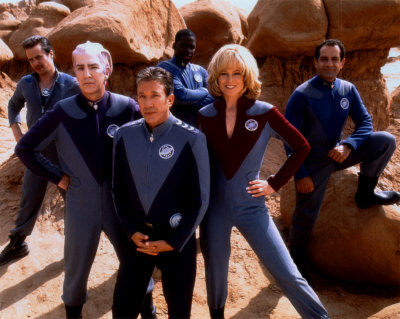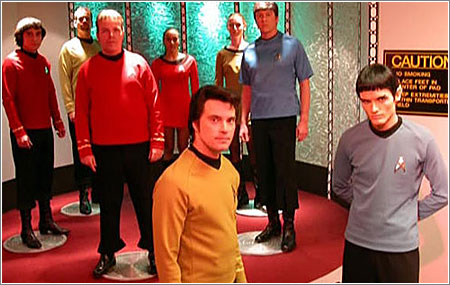Prompts for Week 8
March 18th, 2008 by BobHere are some thoughts to help synthesize this week’s readings and screenings. As always, feel free to use the comments section to explore or go beyond these prompts.
- Star Trek: New Voyages (a k a Star Trek: Phase II) seems to illustrate key points of Chris Anderson’s “Long Tail” thesis: it’s the product of newly “democratized” tools of digital video production, it’s distributed via online channels to the specific audience that seeks it out, and it represents the collaborative blending of amateur and professional talent. At the same time, the show’s near-religious allegience to the established Star Trek franchise suggests that the coming era of grassroots media production may play out along the same branded, consumerist lines as always. What do you think the show indicates about contemporary media authors and audiences? Do you see it as an anomaly, part of a coming trend, or something else entirely?
- Rebecca Tushnet discusses the legal definition of “transformative works.” Where might New Voyages fall in the taxonomy she lays out? In what ways does the participatory culture of the New Voyages makers complicate our ideas of copyright and intellectual/artistic property, if at all? Finally, how would you compare the New Voyages to slash vids, fan fiction, and other types of fan creativity we’ve looked at?
- Galaxy Quest presents us with yet another fantasy of texts “coming to life,” but does so with frank acknowledgment of the tawdry backstage end of franchises: aging actors struggling to make ends meet by appearing at conventions and bank openings. The film, in other words, seems as much about the business of fandom as it is about fans themselves. It also appears to be concerned with the importance of community (here figured as different types of “family”) to fan belief and practice. Does Galaxy Quest seem to shed a different light on the pictures of fan identity and fandom we’ve seen previously? What does it say about contemporary culture that a mainstream science-fiction comedy film on this subject was greenlit and released to audiences (and to pretty good box office)?
- Going back to points raised in today’s discussion (and perhaps between the lines of Jenkins’s “Afterword” and Kristina Busse’s essay), how does gender factor into both New Voyages and Galaxy Quest? Are these texts parables, in different ways and on different levels, of “boys and their toys”? How do women figure into their narratives, and what implicit messages/meanings about gender are constructed thereby?
Posted in Politics, Screenings | 2 Comments »


Illy’s reply to Danielle’s post on sports fandom had me thinking, and sort of led into my prompt response, so bare with me.
Particularly thought-provoking was her last point, where she noted that fans of television shows are demeaned because they relish the intangible, imaginary, and “unreal” worlds that are depicted on screen. While this is an astute point, I can’t help but recall the ever-so-popular Velveteen Rabbit theory, explaining that reality is determined on an individual- rather than a collective- basis. So I can accept the possibility that mainstream society may believe Illy’s argument to a certain degree. But I personally don’t think that I can espouse this view. And here’s why:
The Thermian race in Galaxy Quest lived according to the experiences, lessons, and technology that were laid out in the original Galaxy Quest television show. Because the alien race is depicted as naive and narrow-minded, it is easy to dismiss their way of life as equally such, or imaginary. However, the very vehicle- literal and narrative- that advances the story, is the Thermian’s version of The Protector, a devise which, in the diegetic sense, is a very real thing.
It is in the spirit of this act of appropriation and realization that I argue that media fans, analogous to the Thermians, are engaging in something that is no less “real” than a sports fan’s rituals. The convergence of elements from a television show into one’s life in essence makes it real. Just as some fans root for teams that remind them of their childhoods or moments of family bonding, fans of television shows often share the same reasons for religious viewing and taking part in other fan practices. So it would be safe to claim that what someone is a fan of is in some ways a projection of the self. The connection between them is so strong that communities and families are forged on the pretenses of these shared experiences. So when certain ideas/practices are as deeply rooted in one’s identity, it would be inconsiderate to deem their application as imaginary or unreal. So long as a fan’s participation evokes an outcome that is very real to the individual (be it nostalgia, personal betterment, sense of belonging, or even escapism), in that context it can no longer be labeled anything but real.
So with the Thermians in mind, I think that Galaxy Quest uniquely approaches the nuances of the fan experience; even though they do parody the stereotypical convention fan, the journey that the crew embarks on eventually legitimizes the fan’s deeply personal, very real relationship with a program that isn’t.
I definitely agree with Brandon. Galaxy Quest seems to justify the engagement that television fans have. Fandom and fan activities become very important and very real by the end of the movie. There seems to be a moralizing point in Galaxy Quest involving fans, because we see the protagonist (Tim Allen) go from being a huge jerk who capitalizes on fan adoration with no respect for them as people to being greatly in debt to them for helping him save the galaxy.
In terms of fan activity as being something real and legitimate, I also thought it was interesting that what ends up saving the galaxy is Brandon demanding that everyone get online in order to do faster communication. The movie shows that Internet communication is an extremely important tool for fan interactions with one another. It also relates to this week’s reading by Thompson, where she addresses how fans use different websites to share and access information. Although in Galaxy Quest they are not going to a particular site, they are sharing information through a web and accessing information at a previously unprecedented rate. The fans’ activity is not approved by the television station, but through very careful unsanctioned analysis, they create complete plans and models of the Protector that are, were they on a website, making very specific details about the show available to everyone who has Internet access.
However, an important part of the movie in terms of fan activity, is about creating capital. The last line of the film before they show the new opening credits for Galaxy Quest is “Don’t forget to buy a Galaxy Quest T-shirt.” The fan-cast interactions happen at conventions, where people must register and pay a fee to get in. They open new electronic stores. This shows that generating capital and having stuff from the particular fan text is an important part of fan interaction and activity. As we saw in Trekkies, the buying and selling of stuff is an important part of conventions.
Fan activity is real, in different senses. On the one hand, it is real because as Brandon pointed out, the Thermians interpreted the shows as “historical documents”—texts that were very taken as fact (the ultimate fan text? Colliding the boundaries of reality and fiction?) and that fans can have a real impact on a show, but also because there is a gain of material stuff (a lot of the time) in fan interaction.